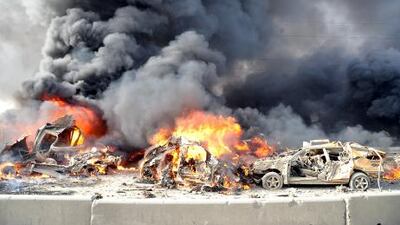BEIRUT // Twin suicide blasts killed 55 people and wounded more than 370 in Damascus yesterday, Syrian officials said, in the deadliest attack in the Syrian capital since the country's uprising began 14 months ago.
The car bombs went off seconds apart during the morning rush hour near a busy intersection. The Syrian Ministry of Interior blamed “suicidal terrorists” for the attack.
The target appeared to be a military intelligence compound, the facade of which was damaged when the more than 1,000 kilograms of explosives inside the two cars detonated shortly before 8am.
The blasts left two large craters outside the compound, which houses a notorious branch of the military intelligence. The Syrian state news agency, Sana, posted gruesome images of bloodied corpses and body parts strewn on the road.
Some of the dead were pictured still in the driver’s seat of their cars, while in some images heavy black smoke billowed from mangled vehicles.
“The house shook like it was an earthquake,” said Maha Hijazi, a housewife, as she stood outside her home across the street from the targeted compound in the Al Qazaz neighbourhood.
There was no immediate claim of responsibility for the bombings. Syria’s foreign ministry said the attacks were a sign it was facing foreign-backed terrorism and urged the UN Security Council to combat countries or groups supporting such violence.
“Syria stresses the importance of the UNSC taking measures against countries, groups and news agencies that are practicing and encouraging terrorism,” the Sana quoted the ministry as saying in a letter to the UN body.
The government has repeatedly accused the Qatar-based Al Jazeera and Saudi-owned Al Arabiya news channels of inciting violence in Syria. Qatar and Saudi Arabia have called for the arming of the rebels fighting the regime of President Bashar Al Assad.
Some opposition members, however, have said the government has orchestrated such attacks in an attempt to discredit the uprising and back up its assertion that terrorist groups are responsible for the crisis in Syria.
Major General Robert Mood, the head of the United Nations observer team in Syria, visited the bomb site, saying that Syrian people did not deserve such "terrible violence".
“It is not going to solve any problems,” he said. “It is only going to create more suffering for women and children.”
This latest day of violence has further undermined efforts to enforce a UN-brokered ceasefire that was supposed to come into effect on April 12. Since then, opposition groups say hundreds of people have been killed.
Yesterday, the UN-Arab League special envoy to Syria Kofi Annan condemned the attacks and appealed for calm.
“These abhorrent acts are unacceptable and the violence in Syria must stop,” he said in a statement. “The Syrian people have already suffered too much.”
The US embassy in Beirut also quickly condemned the blasts in statements posted on its Twitter account. The US embassy in Damascus was closed earlier this year as tensions between the two countries mounted over Washington’s support for the uprising.
“The indiscriminate targeting and killing of civilians is reprehensible and unacceptable in any context,” the US embassy in Beirut said. “We continue to call on the Syrian regime to fully and immediately implement the Annan plan.”
The European Union described the bombings as “pure terrorism”, but stressed Mr Annan’s plan was still the “best option to try to ensure peace in Syria”.
Members of the Syrian opposition yesterday distanced themselves from the bombings.
“The government is trying to make Kofi Annan’s plan fail,” said General Mustafa Al Sheikh, a leader of the rebel Free Syrian Army. “These bombs are not the work of opposition fighters.”
The UK-based monitoring group, the Syrian Observatory for Human Rights, has said 849 people - 628 civilians and 221 soldiers, including 31 defectors - have been killed since the truce officially began. The toll did not include deaths from yesterday’s blasts.
This was not the first large-scale attack against security targets in central Damascus, which remains under the control of forces loyal to Mr Al Assad.
Another suicide attack targeted security forces in the capital in late April, killing at least nine people. An earlier attack in March killed at least 27 and in January an explosion left 26 dead.
At least 44 people died in another twin bombing outside an intelligence compound in Damascus in December last year.
The UN has estimated that at least 9,000 people have been killed in the 14 months since the revolt began. Syrian authorities have blamed the violence on foreign-backed terrorist groups, which they say have killed at least 3,000 members of the security forces.
zconstantine@thenational.ae
* With additional reports by the Associated Press, Reuters and Agence France-Presse
